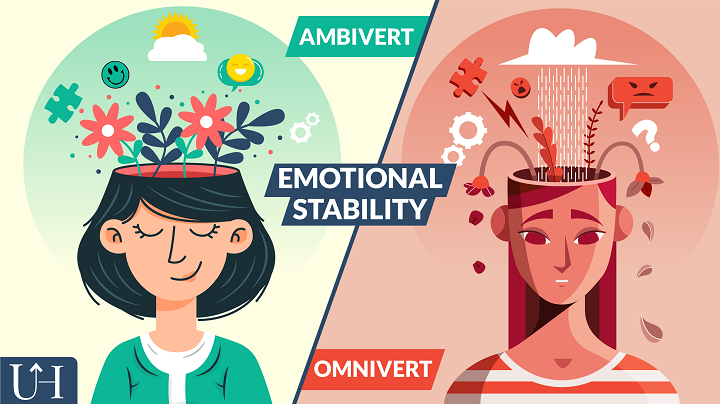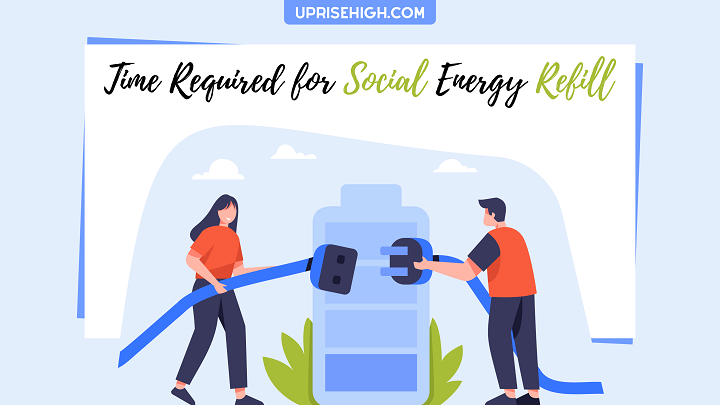Ambivert vs. Omnivert: The Best Explanation Ever! (+Quiz)
By Varun Pahwa • July 5, 2024

You would have always heard that a person can only be one of two personalities – introvert or extrovert.
But what if you don’t fall into any of the categories? Are you someone strange and exceptional?
Not at all!
Let me tell you an interesting fact. You might be an ambivert or omnivert.
Never heard these terms before? No worries!
In this post, I’ll tell you “who are ambiverts,” “who are omniverts,” and give you a detailed comparison of ambiverts vs. omniverts.
The exciting part is that there’s a quiz waiting for you at the bottom of the post that will help you quickly identify whether you’re an ambivert or an omnivert.
Let’s dive right into it.
Who Is an Ambivert?
If you’re like most people, you’ve heard the term “ambivert” thrown around but don’t exactly know what it means.
An ambivert is somebody who exhibits both introverted and extroverted behavior tendencies. They’re not necessarily one or the other, and they don’t necessarily have to stick to one personality type all the time.
Did You Know? : According to Barry Smith (Professor and Director of the Laboratories of Human Psychophysiology at the University of Maryland), ambiverts constitute 68% of the total population.
Who Is an Omnivert?
Have you ever met a person who’s the life of the party one day and completely vanishes the other day? You call them, but they don’t even pick up or call back!
That person may be an omnivert.
An omnivert is at the extremes of introversion or extroversion at different times. They can be deeply introspective one moment and wildly outgoing the next. Depending on their mood and surroundings, omniverts constantly switch between these two poles.
Omniverts are people who are constantly changing, and that can make them really interesting and unique individuals.
Ambivert vs. Omnivert Test
Are you finding it hard to identify whether you’re an ambivert or an omnivert?
If so, here’s an ambivert vs. omnivert quiz that might help you:-
Ambivert vs. Omnivert: 10 Differences You Only Need To Know
1. Place on Personality Spectrum.
Ambiverts lie somewhere between introverted and extroverted on the extraversion scale. On the other hand, Omniverts lie on the extremes.
Ambiverts have consistent behavior. They are comfortable with quiet and active moments but tend to be outgoing and social when the situation demands it.
Omniverts are extremely outgoing at the point when their extroverted mode turns on. You won’t find them much at home because they’ll be partying too much and hanging out with friends.
But as soon as the social energy of omniverts gets low, they won’t just tone down. Instead, they switch to the introverted mode and completely isolate themselves. Further, they don’t even leave their home, pick up calls, or hang out with anyone.
2. Interaction With New People.

Ambiverts are a mix of introverts-extroverts, so they blend quickly with new people. They don’t face any difficulty while handling introverted and extroverted people. They easily communicate and connect with people of any age group.
Unlike Ambiverts, the interaction of omniverts with new people mostly depends on their mood.
If omniverts are in their introverted mode, they don’t even consider mixing with or talking to anyone and live in their own space. However, if the exact same omniverts are in the extroverted mode, they become the party’s life, and you’ll see them laughing with everyone.
3. Predictability.
Ambiverts are consistent with their partial introvert-extrovert personality. So, people find it easy to predict their mood and how they would react to situations.
On the other hand, Omniverts sharply shift from introverted to extroverted personality. So, it’s highly challenging for people to predict their behavior. In the morning, they might share much about themselves with you if they’re in extroverted mode. But in the evening, they might not even have a small chit-chat with you.
4. Maintaining Balance.
Ambiverts are individuals who maintain a healthy balance between their two poles – the introverted personality type and the extroverted personality type. It means they function effectively in social and solitary environments and don’t feel overwhelmed by either.
Contrary to ambiverts, omniverts find it hard to maintain personality balance because they consistently switch from introverted to extroverted mode and vice-versa.
5. People’s Perception.
Ambiverts quickly socialize and adapt to their company. Further, they are balanced (neither introvert nor extrovert), so people find them pretty normal.
On the other hand, Omniverts change themselves according to their mode (introverted or extroverted). One moment they’re talking to everyone, and the other, they’re sitting alone in their room. They literally act like two different people at different times. So, because of their fluctuating behavior, some people find them a bit weird.
6. Emotional Stability.

Ambiverts are typically more emotionally stable than omniverts.
Ambiverts are more likely to be able to regulate their emotions and maintain a positive mood because they have a balanced emotional response. They are not overly emotional or under-emotionalized in different situations.
On the other hand, omniverts are typically more reactive than ambiverts. Their reactions depend on their present introverted or extroverted mode. Further, they exhibit extreme emotions. One moment, you’ll find them at the peak of anger, and the other, you’ll find them extremely calm.
7. Adaptability According to Situation.
Ambiverts are highly adaptable and can handle a variety of situations really well.
Their adaptability can be helpful in a variety of situations. For example, it helps ambiverts to handle change easily without stressing out. Further, they are typically good at balancing work and personal life.
Change can be overwhelming and even frustrating for omniverts. They try to remain out of the situations they don’t want to be in, which makes them less adaptable.
8. Picking Friends.
Ambiverts typically hang out with a single set of friends. You won’t find them changing their friends’ circle often. They enjoy spending time with people they know and feel comfortable with.
Omniverts have two sets of friends. When they are in the extroverted mode, they enjoy with extroverted friends, party hard, and go on trips. However, when omniverts are in the introverted mode, they either remain alone or spend time with a few introverted friends at home.
9. Public Presentation.
Ambiverts might feel stressed and nervous in meetings, speeches, and presentations but they don’t back off. Their extroverted side helps them lift their spirits and gain confidence. Further, their introverted side helps them plan effectively.
On the other hand, omniverts either perform exceptionally well in public or completely mess up things. They can be bold and confident against a crowd in extroverted mode. But if they’re in the introverted mode, they even find it hard to stand and express themselves in front of a small group.
10. Time Required for Social Energy Refill.

As ambiverts are at the center of extraversion, their social energy doesn’t drain too much. They consistently maintain a good balance between spending time with people and spending time in solitude. Hence, ambiverts don’t require much time to recharge their social batteries.
On the other hand, omniverts drain their social energy excessively before switching from an extroverted to an introverted mode. Hence, they take a lot of time to recharge. At this time, you’ll see them all alone, cut off from the world, and focusing on their thoughts.
7 Similarities Between Ambiverts and Omniverts
Now you know the differences between ambiverts and omniverts. So, here are a few similarities you would love to know:-
1. Both ambiverts and omniverts don’t fit into a specific personality (introvert or extrovert).
2. Both have traits of introverts and extroverts.
3. Both enjoy company as well as solitude.
4. Both feel drained after too many social interactions.
5. Both are good at speaking and listening.
6. Both require “me time.”
7. Both can quickly identify fake and genuine people.
End of the Line
I hope this post helped you clearly identify whether you’re an ambivert or an omnivert. If yes, make sure to let me know your personality type in the comments below.
It might seem exciting to be the other personality that you’re not. For example, you may want to become an omnivert if you are an ambivert or vice-versa.
But, the truth is that you don’t need to change yourself. Both personalities have their own strengths and weaknesses.
It’s a much better idea to embrace who you are, constantly improve yourself, and never settle until you become your best version.
You got this, mate!
| SPREAD THE LOVE
| WRITTEN BY

Varun Pahwa
Hey there! I’m Varun, founder of Uprisehigh.com. I’m committed to helping people through relationship problems and general life issues so they never feel alone.
While not blogging, you’ll find me lifting weights, spending time in solitude, seeking life’s answers or enjoying time with close ones.
Join me on Uprisehigh and just like a close friend, you’ll find me by your side on every step of your life journey!
| YOU MIGHT ALSO LIKE







This was really helpful.
I thought something was wrong with me.
I could be overly joyful one minute and extremely introverted the next.
I thought I was mentally unstable, I didn’t know that I was an omnivert.
There’s nothing wrong with you, Win. You’re unique and amazing just the way you are! Multiple humans were created exactly to have multiple personalities on Earth.
Nice, I’m an omnivert
Whoa, I’m also an omnivert, I’m so glad that I read this website because for the past few months, I tried to change myself to become an ambivert because I think they are better but nope! I’m happy with who I am today 🙂
Hey Ashley,
You are absolutely perfect just the way you are! No need to change yourself. Keep smiling.